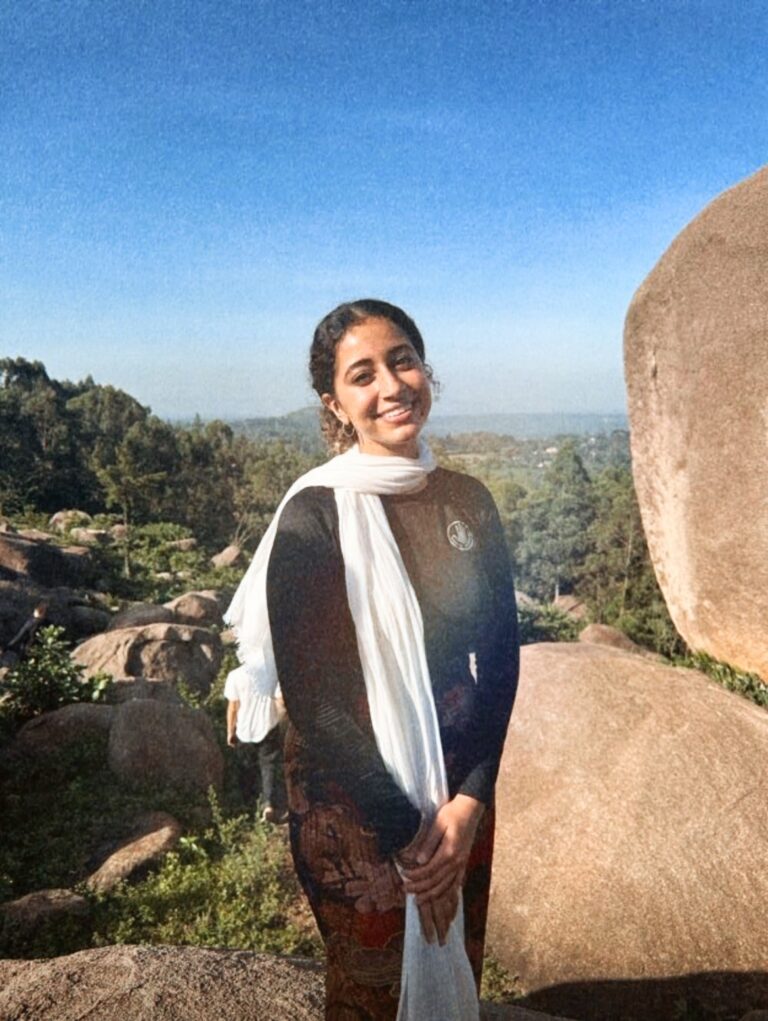Program: Health and Society (PhD)
Supervisors: Dr. Anthea Innes and Dr. Matt Savelli
Helana Marie Boutros is a Coptic Christian indigenous woman currently pursuing a PhD in McMaster’s Health and Society stream. Her research thesis intersects at spiritual health, community health, intergenerational Coptic women’s well-being, diasporic lived experiences, indigeneity and the Coptic Orthodox Tradition. Outside of her thesis, Helana holds two research positions – at Wilfrid Laurier University and ICES seconded to the Métis Nation of Ontario – where she does work pertaining to the health of Black older adults and Métis health and wellness. When she isn’t working, Helana often spends time with her Coptic community, reading, painting, hiking or writing poetry.

Why did you choose to explore research at McMaster University?
McMaster faculty were interested in the work that I was doing, and I felt right at home! My thesis topic (Exploring Diasporic Coptic Women’s Lived Experiences of Spiritual Health) is very niche to my own community here in the GTA and reception to the work that I was doing was a key indicator of my “university home” while pursuing my doctorate.
Why did you get involved in your specific area of research or academic program, and what interests you about it?
First and foremost, my faith is important to me and though I took my faith for granted in the past, I am learning to cherish it. Often in academia, many researchers are closeted about their belief systems, faith, and religion. Though I understand where many researchers are coming from, I do not necessarily agree with closeting one’s faith. Succinctly, my positionality is my faith – as Lara Deeb articulates, “Faith is not just a mystifying thing that we need to look past… faith is what is going on.”
Second, the beautiful, intergenerational women in my life inspired me. I saw so many strong women in my own family who have shaped families and generations – two of which are my maternal grandmother and mama, and I dedicate this research to them.
And finally, I want to preserve the lived experiences of my community through writing. Ever since I was a child, I grew up constantly taking a journal with me everywhere I went. My mama gifted me my first journal when I was four – she is the reason why I write. I “gardened” words, phrases, and memories from a very young age – I preserved them. I grew up quite reticent and quiet, but my mind was never quiet – I was constantly reflecting, writing things down and iteratively forming visual collages in my bedroom for my own learning and epistemological cohesion. Little did I know, I was doing ethnography and fieldwork. Now, as a first-year PhD student, I am revisiting the habits of my childhood but with keenness and refinement to preserve the stories of my community in a compelling, authentic, and beautiful way.
What are your career aspirations or plans following completion of your current training?
I would love to be a professor and a skilled anthropologist with a gift for beautiful writing that inspires others and brings community together.
What excites you most about your research so far?
Within the context of my own ethnographic work that I’ve conducted so far with my community, putting the work that you are doing in a coherent, captivating story is one of the most exciting aspects of research for me.
What do you find most challenging about your research area and how have you overcome these challenges?
One major challenge is that Coptic research in relation to health is often overlooked: Coptic research has mainly focused on theology, antiquity and cultural anthropology in the past. However, I have to encourage myself and remind myself that just because research is absent doesn’t make the work that I’m doing any less important. This often motivates me to pursue the work that I’m doing.
What qualities do you consider important for success in your specific area of research?
Humility, discipline, wonder and enchantment.
More About Helana
- SSHRC Doctoral Fellowship, Government of Canada, April 2024
- The Brooke and Irene Townsend Scholarship, McMaster University, February 2024
- The Ronald Bayne Gerontology Award , McMaster University, February 2024
- Ontario Graduate Scholarship, Government of Ontario April 2023
Bhalla, M., Boutros, H.M. & Meyer, S.B. Aunties, WhatsApp, and “haldi da doodh”: South Asian communities’ perspectives on improving COVID-19 public health communication in Ontario, Canada. Can J Public Health 113 (Suppl 1), 46–53 (2022). https://doi.org/10.17269/s41997-022-00712-x
Boutros, H. M., Koprich, S., Simms, A. J., Tsui, N., Boyle, R.-A., Harrison, J., Riddell, M., Sanftenberg, S., Cripps, S., & Edwards, S. A. (2024). Landscape of Métis health and wellness: protocol for a scoping review. BMJ Open, 14(3), e077868. https://doi.org/10.1136/bmjopen-2023-077868
Faruqui, A., Tjong, G. B., Boutros, H. M., Stutz, S., & Mashford-Pringle, A. (2024). Programs supporting incarcerated and previously incarcerated indigenous peoples: a scoping review protocol. International Journal of Circumpolar Health, 83(1), 2343144. https://doi.org/10.1080/22423982.2024.2343144
- Honours Bachelor of Science (Major: Health Sciences; Double Minor: Psychology and Liberal Arts)
- Master of Public Health with a Field Specialization in Indigenous Health
